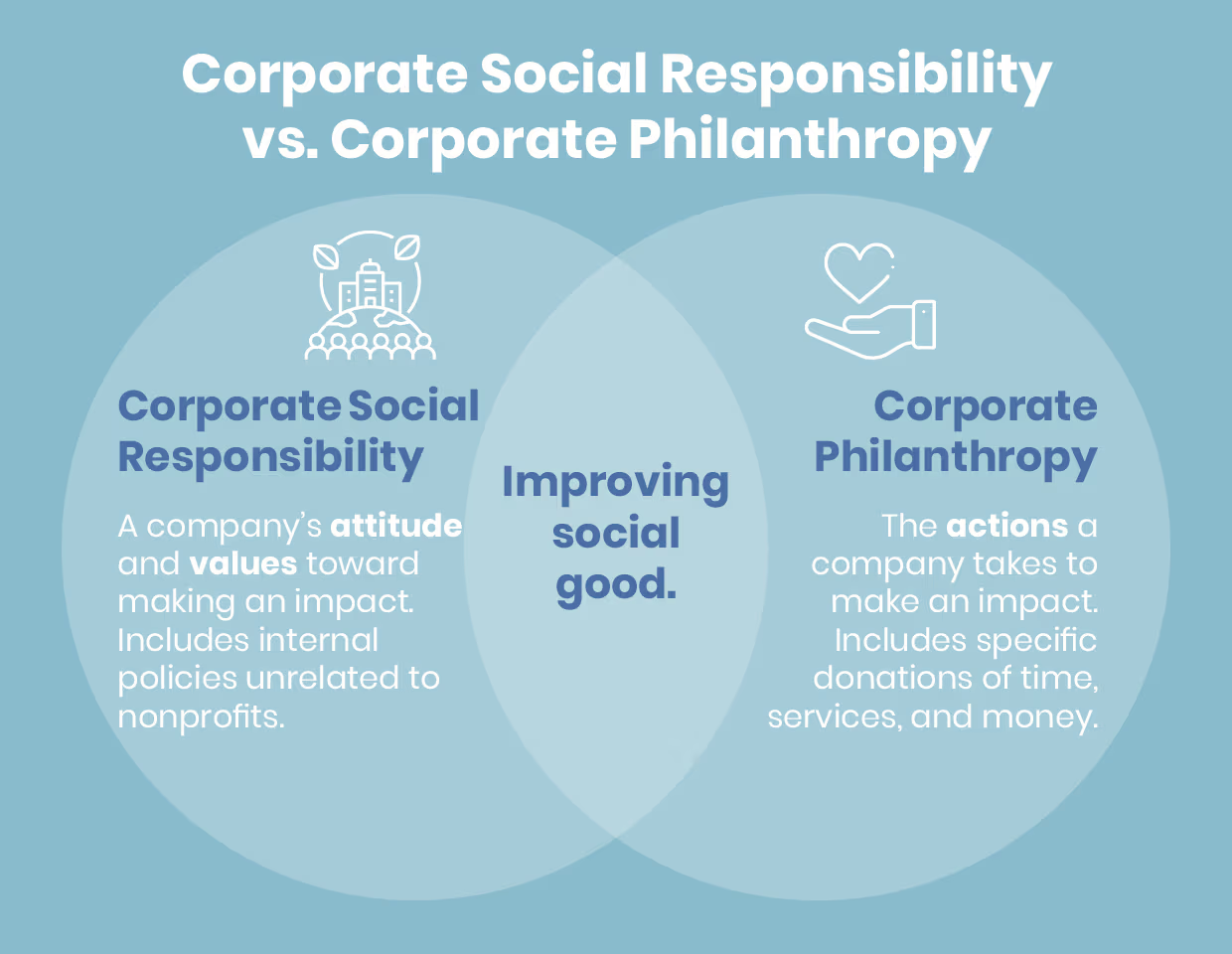The Role of Company Philanthropy in Fostering Sustainable Business Practices
Corporate philanthropy has emerged as an essential method for services intending to incorporate sustainability right into their procedures. By aligning corporate goals with ecological and social efforts, organizations can promote much healthier ecological communities. This method not only improves business online reputation yet likewise strengthens stakeholder relationships. Nonetheless, real extent of its influence on long-term business success remains to be explored. What cutting-edge techniques are being embraced consequently?
Understanding Company Philanthropy and Its Relevance
Business philanthropy works as a vital mechanism with which companies can add to social health while enhancing their very own track records. This technique includes companies assigning sources, such as funds, time, or knowledge, to sustain neighborhood campaigns, charitable reasons, or social programs. By participating in kind initiatives, firms can resolve pushing social issues, such as education, healthcare, and environmental concerns, consequently playing an essential duty in fostering positive change.
Additionally, company philanthropy can enhance staff member morale and bring in ability, as people progressively look for to benefit socially liable organizations. It can likewise strengthen consumer commitment, as consumers favor brand names that show a dedication to making a distinction. Inevitably, comprehending the significance of corporate philanthropy lies in identifying its double benefits: improving area welfare while at the same time boosting organization reliability and dependability in the eyes of stakeholders. This positioning of social obligation with industrial passions emphasizes its significance in today's corporate landscape.
The Connection Between Company Philanthropy and Sustainability
While many business participate in philanthropy to enhance their public picture, a much deeper link exists between company philanthropy and sustainability. Business philanthropy commonly aligns with lasting practices by sustaining efforts that deal with environmental and social difficulties. They contribute to a much healthier ecological community and society when organizations spend in area tasks, renewable power, or educational programs. This dedication not only cultivates a good reputation however likewise reinforces stakeholder relationships, boosting brand name loyalty.

Instance Studies: Effective Business Philanthropy Initiatives
Various business have effectively incorporated philanthropic campaigns into their service approaches, showing the concrete advantages of such commitments. For example, Microsoft has introduced countless programs, such as its AI for Planet effort, which supports ecological sustainability through technology. This method not only aids preservation efforts however additionally boosts Microsoft's reputation as a leader in company obligation.
Unilever's Sustainable Living Plan highlights ecological and social influence, aligning its philanthropy with business purposes. By funding tasks that enhance hygiene and hygiene, Unilever enhances its brand while adding to global health.
One more noteworthy example is Patagonia, which vows 1% of sales to ecological reasons. This commitment resonates with customers, fostering loyalty and driving sales.
These case research studies highlight that reliable corporate philanthropy can produce economic returns while promoting lasting methods, strengthening the concept that ethical business techniques are advantageous for both culture and base lines.
Building Stronger Stakeholder Relationships With Philanthropy
Philanthropy functions as an essential device for firms looking for to enhance their partnerships with stakeholders, as it cultivates count on and shows a dedication to social duty. By engaging in philanthropic efforts, businesses can connect with neighborhood communities, enhancing their credibility and motivating stakeholder loyalty. This engagement usually brings about meaningful interactions, developing a feeling of shared worths in between the company and its stakeholders.
Kind initiatives can deal with specific neighborhood demands, permitting companies to add favorably to societal obstacles. This involvement not only showcases a business's moral position but likewise aids in drawing in and preserving customers that prioritize social responsibility.
Furthermore, workers often feel extra motivated and involved when they see their company actively taking part in philanthropic tasks, causing an extra efficient workplace culture. Business philanthropy comes to be a tactical opportunity for constructing stronger, extra durable partnerships with diverse stakeholder groups.
Determining the Influence of Business Philanthropy on Company Success
The connection between business philanthropy and stakeholder interaction sets the stage for assessing its effect on overall service success. Organizations frequently measure this effect via different metrics, consisting of brand name reputation, employee contentment, and client commitment. Philanthropic initiatives can enhance a business's photo, fostering trust amongst investors and consumers alike. Additionally, involved workers often tend to display higher spirits and performance, straight associating to improved organization efficiency.
Measurable analysis can additionally be used, with go right here companies assessing economic returns versus philanthropic expenses. Research study suggests that business with strong philanthropic commitments typically experience higher supply efficiency and decreased volatility. Furthermore, qualitative assessments, such as stakeholder feedback, can give insights into neighborhood assumptions and long-term relational advantages.
Inevitably, determining the impact of business philanthropy needs a multifaceted strategy, incorporating both measurable and qualitative information to assure a comprehensive understanding of its impact on service success. corporate philanthropy.
Regularly Asked Inquiries
Just How Can Little Organizations Participate In Company Philanthropy Effectively?

What Are Usual Misunderstandings About Business Philanthropy?

How Does Business Philanthropy Influence Worker Morale?
Business philanthropy favorably affects worker spirits by cultivating a feeling of purpose, enhancing task fulfillment, and advertising commitment. Staff members typically really feel more involved and motivated when their firm contributes to social causes, developing a helpful job environment.
What Are the Tax Advantages of Business Philanthropy for Businesses?
Company philanthropy offers substantial tax advantages for organizations, consisting of reductions on philanthropic contributions and potential decreases in gross income. These motivations motivate firms to involve in social efforts while simultaneously improving their monetary standing.
Just How Can Business Pick Reliable Philanthropic Allies?
Firms can pick reliable see this site philanthropic partners by examining positioning with their values, assessing influence potential, taking a look at economic transparency, and promoting solid interaction. This calculated technique enhances partnership and warranties common advantages for both parties included.
Corporate philanthropy serves as a vital system with which businesses can contribute to societal wellness while improving their very own credibilities - corporate philanthropy. Inevitably, understanding the value of corporate philanthropy lies in acknowledging its double advantages: enhancing area well-being while all at once improving organization credibility and reliability in the eyes of stakeholders. While lots of companies involve in philanthropy to improve their public picture, a deeper connection exists between company philanthropy and sustainability. The connection between business philanthropy and stakeholder engagement sets the phase for reviewing its influence on total service success. Corporate philanthropy provides considerable tax advantages for companies, including reductions on charitable contributions and prospective reductions in taxed earnings